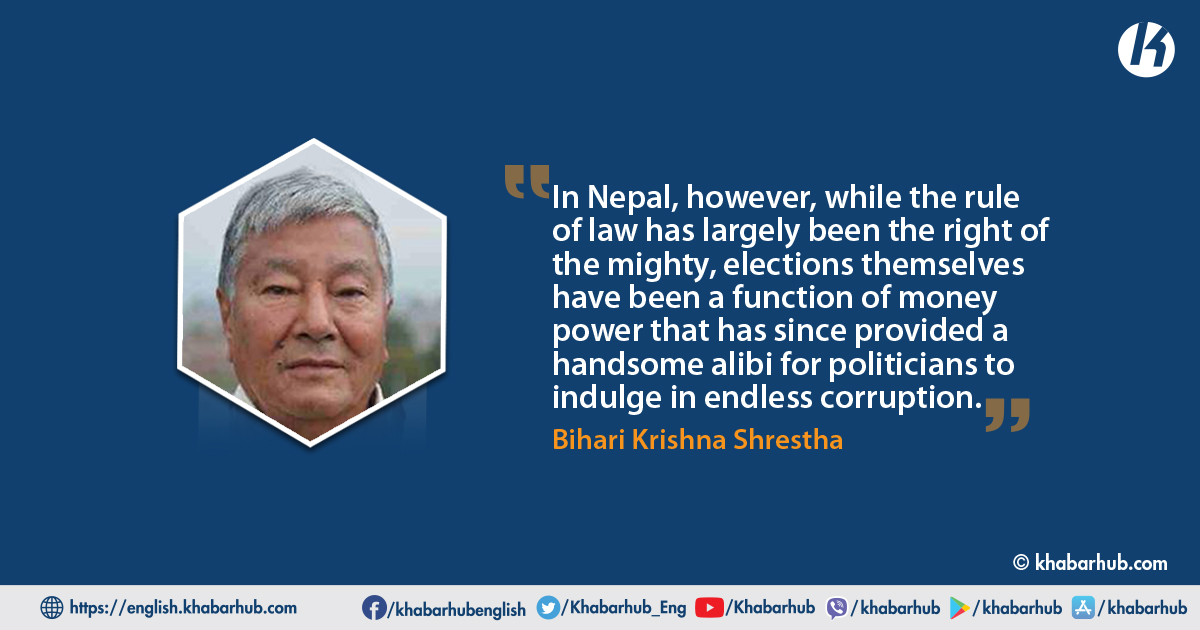Democratic transformation arrested by persistent feudalism: Nepal remains condemned to live and relive with the same corrupt politicians and their chronically corrupt politics masquerading as people’s representatives and democratic politics for the entirety of the last three decades of so-called democratic restoration in 1990.
To add injury to insult, it was also punctuated by a decade-long killing spree under the false flag operation called Maoist insurgency that, having taken the lives of some 18,000 innocent Nepalese and maimed, displaced and disappeared thousands more, has since catapulted its perpetrators to the helm of state affairs, even as they have successfully evaded the long-promised TRC process leaving its hundreds of thousands of their victims to languish in endless misery.
While Western democracies seem to be equipped with the built-in force for allowing people’s preferences to prevail through effective adherence to rule of law and through periodic elections that ensured the change of guard when the government in power fails to deliver.
In Nepal, however, while the rule of law has largely been the right of the mighty, elections themselves have been a function of money power that has since provided a handsome alibi for politicians to indulge in endless corruption.
The result has been that the more Nepal changed, the more it remained the same.
While Nepal has gone through some drastic changes in the forms the constitutional monarchy and parliamentary democracy of the Nineties to the current federal republicanism, the politicians at the helm and their politics have remained largely unchanged: the same high caste male feudal elites leading the political parties until death do them disappear (like NC’s BP Koirala and Girija Koirala, RPP’s Surya Bahadur Thapa).
Back in the late Eighties, the mafia-like corrupt forestry ministry then was adamant in its refusal to devolve authority to local forest users to manage their own forests as required by the new Decentralization Act of 1982, and no political authority in the government was taking it seriously, even as Nepal’s devastating forest was at the brink of desertification.
And gerontocracy continues to pervade across all parties. This is just the continuation of the village feudal tradition under which the Thalus (high caste and rich feudal elites) lord over the community and extract resources from the neighbors and village commons without any accountability to go with it.
These very thalus too lead the local bodies, political parties and community institutions and are succeeded by their own male offspring upon their ultimate demise.
International concern
However, there has been little international concern about these hopeless governance conditions in landlocked Nepal. International development assistance has continued to flow and the donor institutions and countries hardly bother about the fact that corrupt politics have vitiated the very purpose of their largesse.
While the multilateral lending institutions reward their employees for their ability to push more loans to borrowing countries irrespective of how they are used, the jobs of the bilateral donor officials remain assured only by the uninterrupted flow of funds from their headquarters.
That requires glossy progress reports that purposely obfuscate their continuing failure to deliver.
A German scholar’s interest
It has been in such a context that a German scholar and Nepal expert, Karl Heinz Kramer has lately written on Nepal’s “Democracy and political parties in crisis” in this very digital portal, Khabarhub, on April 18, 2021.
Very significantly, he has drawn our attention to one of the most crucial issues in Nepal democratic transformation when he observed that “generational change (in political parties) must be linked to a complete renewal of the political parties” themselves too that also assures “adequate social inclusion….in the multi-ethnic state of Nepal.”
He also pleaded for the long-ignored issue of the Truth and Reconciliation Process by arguing that “The people (affected by) the Maoist insurgency want the state to finally provide justice for the victims and to punish the perpetrators” appropriately.
Thalus feel no shame in corruption and blatant misconduct
One of the facts of life of being a Thalu is that he has absolutely no sense of shame even as his acts of extortion, corruption and blatant misconduct become public knowledge.
This is so because he knows that they are simply powerless to do anything against him. The same mindset is also true of our politicians at the national level.
For instance, a few years ago, as an anthropologist I was speaking to a conference of 35 “second-ranking leaders” from five major parties–that included at least half a dozen former ministers–on the issue of caste, class and identity in Nepal, I had observed that given Nepal’s uninterrupted feudalistic tradition, “just about every single politician is a corrupt man”.
There is thus an opportunity for such professional and altruistic minds to come together for collective action on behalf of chronically impoverished Nepal and force international agencies to take a more honest and professional stand while extending much-needed aid to Nepal.
While I was bracing myself for a hostile reaction from the participants, what instead transpired was that the whole hall erupted in laughter. Apparently, they found the observation irresistibly too amusing.
So to get back to the German scholar’s prescriptions cited above, the fact is that those issues remain unaddressed not because these politicians have been unaware of them; it is so because the incentives are heavily stacked in favor of colluding among themselves to the total and deliberate neglect of the cause of the people, or in short, arrested democratic transformation.
But external pressure delivers
Since Nepal is near totally dependent on foreign resource infusion for most of its development activities, major donor agencies do have the leverage to make a difference, although, for reasons explained above, they prefer to stay away from using them. But at least, in my own experience, there has been a major exception.
Back in the late Eighties, the mafia-like corrupt forestry ministry then was adamant in its refusal to devolve authority to local forest users to manage their own forests as required by the new Decentralization Act of 1982, and no political authority in the government was taking it seriously, even as Nepal’s devastating forest was at the brink of desertification.
However, one day in 1987, the entire team of a World Bank mission–that was then in Kathmandu for lending US$50 million in Structural Adjustment Loan to Nepal–happened to walk into my office in the National Planning Commission, and I used that opportunity to persuade them to use the introduction of forest user groups as one of the conditionalities for the loan.
That move then stirred the ministry of finance into action. It immediately went after the forest ministry that then amended its forest legislation and gazette it on 12 April 1988 making the forest user groups the legal local entity to manage their own forests.
It was the result of that strategic World Bank pressure that Nepal today has one of the best forests in the world.
Need for international civil society coalition on Nepal’s behalf
To conclude, Nepal does have many friends among expatriate professionals around the world, including German scholar Mr. Kramer quoted above.
There is thus an opportunity for such professional and altruistic minds to come together for collective action on behalf of chronically impoverished Nepal and force international agencies to take a more honest and professional stand while extending much-needed aid to Nepal.
The point is that dollars do not matter as long as they remain unaccompanied by necessary institutional reforms as in the case of the world-applauded forest user groups.
(The author is a former government Secretary)
The views expressed in this article are the author’s own and do not necessarily reflect Khabarhub’s editorial stance.









Comment